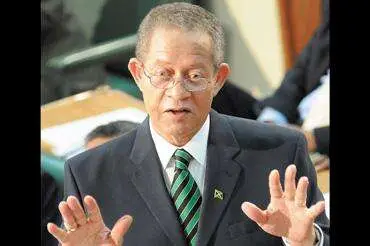
Extradition sidebars
As every great leader knows, how he fights the war determines how he wins and keeps the peace. President John Fitzgerald Kennedy understood this well. In the Cuban Missile Crisis he risked nuclear war to defend a principle.
Prime Minister Bruce Golding is in the fight of his life, standing as he is against the might and power of the United States over an extradition request for Christopher “Dudus” Coke. It is eyeball-to-eyeball, with neither party giving quarter. To ask a question made popular by the Cuban Missile Crisis, “Which of the two will blink first?”
Legal luminaries who have commented publicly speak as if the justice minister who is also the attorney general has committed an infraction or is being purely obstructionist by not placing the matter before the courts for a determination to be made concerning the contingent legal issues surrounding the request. Even to one unschooled in law, it becomes clear on a casual reading of the treaty that the request does not become a matter for the courts until placed there by the justice minister, and the decision to do, or not to do so is entirely within her discretion and her authority. By the strict letter of the treaty, then, the prime minister and his justice minister are still standing on principle.
Without getting directly involved in the imbroglio or predicting what the eventual outcome will be, there are a few sidebars to the main event that are deserving of commentary. Here they are:
*No Jamaican prime minister is assured the support of the citizens of this country if he takes a decision or pursues a course of action that puts in jeopardy the highly favoured and much-desired multiple entry visa, green card, barrel or remittance. This “love” of America and things American transcends political affiliation. When Prime Minister PJ Patterson took the principled decision to allow President Aristide of Haiti brief sojourn in Jamaica on his way to exile, the radio talk shows lit up with calls from concerned citizens fearful that in offending America the prime minister had exposed Jamaica to the danger faced by a cockroach refereeing a chicken fight. This attitude that says America is always right puts Jamaica in a permanent subservient position.
*The persistently high levels of crime and violence have produced some unnatural and even barbaric behaviours on the part of those who are the potential victims. One such behaviour is a vigilante approach to justice where everyone gangs up against the accused. This is the basis on which extradition requests have been handled in past years. Those entrusted with this weighty decision in many instances responded to extradition requests with indecent haste. At the risk of offending some of those who are now criticising the prime minister and the justice minister for their stand in the current controversy with the United States, they, by their lack of due process, violated the time-honoured principle that a man is innocent until proven guilty. By so doing they set a dangerous precedent for how extradition cases are handled.
* It is my humble opinion that this display of “greater affection” for what America offers than for our own principles feeds into the old “banana republic” syndrome. In such a scenario the Americans are emboldened to speak of our leaders and country in the derogatory tones of the 2010 US State Department’s International Narcotics Control Strategy Report. I hold no brief for the prime minister of Jamaica. In those private, heated political debates that we Jamaicans like to have, I may even express some views of his stewardship that are not in the least flattering. But if anybody from outside Jamaica touches him, he is my prime minister and as long as he stands on principles I am rushing to his defence.
Former Prime Minister Michael Manley authored a book entitled, Struggle in the Periphery. Even now – especially now – it is a must-read for those interested in knowing the pressures brought to bear against the leader of a dot of a country on the map in dealing with a colossus like the United States. The job of prime minister becomes lonely at those times. We should stand with our prime minister. It becomes easier if the positions he takes are not solely his own views of right and wrong, but are principled and reflect the broad consensus of the people.
*A decision, though principled, must be subjected to rational and prudent thought about timing and approach. The little boy in Tivoli, Rema or Jungle, looking on and not being able to process all that the prime minister is saying in defence of his decision, could end up thinking that the position of “president” is the highest in the country, even before Jamaica attains republic status. How this matter is handled by the prime minister could inspire another generation of youths who glorify the gun, crime and the underworld. It is in this context that the prime minister must give the deepest reflection to how the legislature and judiciary may be brought into the decision process toward resolving the impasse without sacrificing principle.
Going back to the Cuban Missile Crisis, President Kennedy understood that although right on principle, he needed to give the Soviets a way out of the crisis or confront the inevitable nuclear war. He skilfully crafted an agreement that resulted in the missiles being removed from Cuba while seeming to give the Soviets the respect as equals that they craved. Prime Minister Golding desperately needs to find a way out of the crisis. His decision to ask the courts to rule on the correctness of the justice minister’s decision is not it.
hmorgan@cwjamaica.com
























